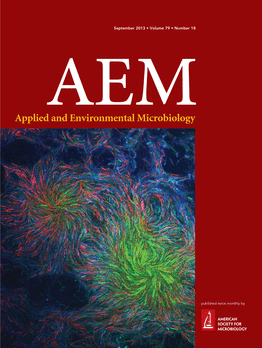The article “The CLO3403/CLO3404 Two-Component System of Clostridium botulinum E1 Beluga Is Important for Cold Shock Response and Growth at Low Temperatures” published by Mascher et al. was selected as spotlight in the current issue (January 2014, volume 80, issue 1) of Applied and Environmental Microbiology.
 Applied and Environmental Microbiology highlighted the article as shown below:
Applied and Environmental Microbiology highlighted the article as shown below:
“A Two-Component System Responsible for Cold Tolerance of Clostridium botulinum Type E
Type E botulism outbreaks are mainly associated with consumption of contaminated, minimally processed, anaerobically packaged fish products, for which thermal control is not sufficient to prevent outgrowth from Clostridium botulinum type E spores. Mascher et al. (p. 399–407) demonstrate a two-component system that is important for the cold-shock response in C. botulinum type E and its growth at low temperatures. Understanding the mechanisms behind the cold tolerance of this life-threatening pathogen may reveal novel insights into the prevention of botulism outbreaks and is thus important for the development of control measures.”
“Copyright © 2014, American Society for Microbiology. All Rights Reserved.”
C. botulinum type E is mainly found in cold regions of the world and highly prevalent in the Baltic Sea and Finnish freshwaters. The authors (Gerald Mascher, Yağmur Derman, David G. Kirk, Eveliina Palonen, Miia Lindström and Hannu Korkeala) were focusing on the cold tolerance of C. botulinum E1 Beluga which allows the organism to grow and produce the life-threatening botulinum neurotoxin at temperatures as low as 3°C. Constructing the first knock-out mutants of C. botulinum type E allowed them to study this organism in more detail and they could show the important role of the CLO3403/CLO3404 TCS in cold tolerance of C. botulinum type E. The group is now investigating the mechanisms regulated by the TCS.
The work was performed in the Finnish Centre of Excellence in Microbial Food Safety Research and supported by the Academy of Finland (grants 141140, 118602), the Finnish Graduate School on Applied Bioscience, the Finnish Foundation of Veterinary Research, the European Community’s Seventh Framework Program FP7/2007-2013 (grant 237942), and the Doctoral Program of the Faculty of Veterinary Medicine of the University of Helsinki.
Link to the article: http://aem.asm.org/content/80/1/1.full
